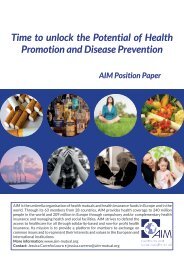Exploring patient participation in reducing health-care-related safety risks
Exploring patient participation in reducing health-care-related safety risks
Exploring patient participation in reducing health-care-related safety risks
You also want an ePaper? Increase the reach of your titles
YUMPU automatically turns print PDFs into web optimized ePapers that Google loves.
<strong>Explor<strong>in</strong>g</strong> <strong>patient</strong> <strong>participation</strong> <strong>in</strong> reduc<strong>in</strong>g <strong>health</strong>-<strong>care</strong>-<strong>related</strong> <strong>safety</strong> <strong>risks</strong><br />
86<br />
Fig . 5 .7 . Number of simultaneously taken medic<strong>in</strong>es for which the risk of <strong>in</strong>teraction is<br />
certa<strong>in</strong>, accord<strong>in</strong>g to doctors<br />
Second-degree specialist<br />
(highest level)<br />
First-degree specialist<br />
Physician<br />
No specialty<br />
%<br />
0 20 40 60 80 100<br />
1–3 medications<br />
3–5 medications<br />
5–7 medications<br />
More than 8 medications<br />
The primary <strong>care</strong> physicians consulted <strong>in</strong> this survey had no practice of report<strong>in</strong>g<br />
ADR occurrence to the designated and specialized centres for monitor<strong>in</strong>g <strong>safety</strong> of<br />
pharmacotherapy: 96% <strong>in</strong>dicated they had seldom (“never” or “sometimes”) and 74%<br />
had “never” reported an ADR. Such responses are alarm<strong>in</strong>g not only <strong>in</strong> the light of<br />
the exist<strong>in</strong>g legislation, 27 but also consider<strong>in</strong>g the results of the pilot study: 90% of<br />
doctors claimed to treat <strong>patient</strong>s with ADRs result<strong>in</strong>g from OTC drug <strong>in</strong>teractions,<br />
and 38% <strong>in</strong>dicated that additional treatment had been required due to ADRs caused<br />
by dietary supplements or herbal medic<strong>in</strong>es. This <strong>in</strong>dicates a lack of adequate awareness<br />
and <strong>in</strong>appropriate practice on the report<strong>in</strong>g of ADRs, which hampers rational and safe<br />
pharmacotherapy and may place <strong>in</strong>dividual <strong>patient</strong>s at risk from unsafe medications.<br />
ADRs were most frequently reported by the highly specialist medical practitioners<br />
(Fig. 5.8), which might suggest the need to revisit the process of CME at PHC level.<br />
Fig . 5 .8 . Frequency of report<strong>in</strong>g ADRs to designated authorities by doctors’ degree of<br />
specialization<br />
Second-degree specialist<br />
(highest level)<br />
First-degree specialist<br />
Physician<br />
No specialty<br />
0 20 40 60 80<br />
%<br />
100<br />
Never<br />
Always<br />
Sometimes<br />
27 Law on Pharmacy; Law on the Profession of Doctor and Dentists; Decree of M<strong>in</strong>ister of Health regard<strong>in</strong>g Monitor<strong>in</strong>g of the<br />
Safety of Medic<strong>in</strong>al Products (17 February 2003).



